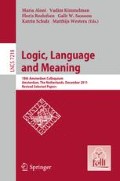Abstract
It is well-known that an English sentence with a complex predicate modified by again displays a repetitive vs. restitutive ambiguity. Like English again, Chinese you ‘again’ modifying a resultative verb compound also exhibits a repetitive vs. restitutive ambiguity. However, Chinese differs from English in that the position of you ‘again’ is relatively fixed: it can only occur preverbally but not postverbally. This study examines how the ambiguity of Chinese you is derived. Investigating the scope interaction between you ‘again’ and an indefinite object, I argue that the ambiguity of you ‘again’ is structural but not lexical. I further propose that you ‘again’ moves overtly as a last resort to satisfy a PF requirement specific to Chinese.
Access this chapter
Tax calculation will be finalised at checkout
Purchases are for personal use only
Preview
Unable to display preview. Download preview PDF.
References
Bale, A.: Quantifiers and verb phrases: An exploration of propositional complexity. Natural Language and Linguistic Theory 25(3), 447–483 (2007)
Cresti, D.: Extraction and Reconstruction. Natural Language Semantics 3, 79–122 (1995)
Dobler, E.: Again and the structure of result states. In: Proceedings of ConSOEL XV 2008, pp. 41–66 (2008)
Dowty, D.R.: Word Meaning and Montague Grammar. Reidel, Dordrecht (1979)
Ernst, T.: Negation in Mandarin Chinese. Natural Language and Linguistic Theory 13, 665–707 (1995)
Ernst, T.: Principles of adverbial distribution in the lower clause. Lingua 114, 755–777 (2004)
Fabricius-Hansen, C.: Wi(e)der and Again(st). In: Fery, C., Sternefeld, W. (eds.) Audiatur Vox Sapientiae. A Festschrift for Arnim von Stechow, pp. 101–130 (2001)
Huang, C.-T.J., Li, Y.A., Li, Y.: The syntax of Chinese. Cambridge University Press, Cambridge (2009)
Kuo, P.: IP internal movement and topicalization. PhD dissertation, University of Connecticut (2009)
Li, C., Thompson, S.: Mandarin Chinese: A Functional Reference Grammar. University of California press, Berkeley (1981)
Nissenbaum, J.: Decomposing Resultatives: Two kinds of restitutive readings with Again. Poster presented at NELS37. University of Illinois, Urbana-Champain (2006)
Rizzi, L.: Relativized Minimality. MIT Press, Cambridge (1990)
Tang, C-C.J.: Chinese Phrase Structure and the Extended X′-Theory. Doctoral dissertation, Cornell University (1990)
Tang, C.-C.J.: Functional Projections and Adverbial Expressions in Chinese. Language and Linguistics 2(2), 203–241 (2001)
Tang, S.: Parametrization of features in syntax. Ph.D. Dissertation, University of California, Irvine (1997)
Ting, J.: NegP and the particle suo in Mandarin Chinese. Concentric: Studies in Linguistics 32(2), 71–92 (2006)
von Stechow, A.: Lexical Decomposition in Syntax. In: Egli, U., et al. (eds.) Lexical Knowledge in the Organization of Language, Benjamins, Amsterdam, pp. 81–118 (1995)
von Stechow, A.: The Different Readings of Wieder. Journal of Semantics 13, 87–138 (1996)
Wang, C.: The microparametric syntax of resultatives in Chinese languages. PhD dissertation, New York University (2010)
Author information
Authors and Affiliations
Editor information
Editors and Affiliations
Rights and permissions
Copyright information
© 2012 Springer-Verlag Berlin Heidelberg
About this paper
Cite this paper
Xu, T. (2012). You Again: How Is Its Ambiguity Derived?. In: Aloni, M., Kimmelman, V., Roelofsen, F., Sassoon, G.W., Schulz, K., Westera, M. (eds) Logic, Language and Meaning. Lecture Notes in Computer Science, vol 7218. Springer, Berlin, Heidelberg. https://doi.org/10.1007/978-3-642-31482-7_48
Download citation
DOI: https://doi.org/10.1007/978-3-642-31482-7_48
Publisher Name: Springer, Berlin, Heidelberg
Print ISBN: 978-3-642-31481-0
Online ISBN: 978-3-642-31482-7
eBook Packages: Computer ScienceComputer Science (R0)

